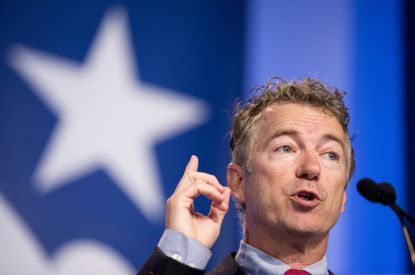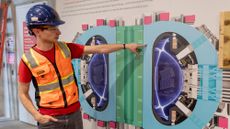Rand Paul is dead wrong about vaccines. But he has a point about the Federal Reserve.
The senator wants to turn monetary policy into an object of democratic deliberation. Liberals should take him up on that.


Sen. Rand Paul (R-Ky.) is in the news this week for his rather kooky views on vaccination. Less noticed was his attempt to re-introduce a bill to audit the Federal Reserve — a policy prescription that has more merit.
It should be stated at the outset that if the Fed ever operated in the way Paul prefers, it would destroy the economy. But his bill, on its face, is merely an effort to open the institution up to more day-to-day political pressure. And political pressure can come from other directions — from, say, progressives and liberals — as well as the right. So the mainstream response to Paul’s efforts, well encapsulated by Catherine Rampell of The Washington Post as “let the Fed do its job,” is both rather obtuse and a giant missed opportunity.
Now, the Fed’s finances are already a matter of public record, as are its meeting minutes and transcripts. Fed chairs regularly appear before Congress. But the law does shield the Fed’s internal deliberations over monetary policy from prying eyes. Paul’s bill would remove that shield, and have an auditor sit in on those deliberations and report to Congress. Everyone agrees this setup would curtail the Fed’s independence and leave it more vulnerable to political influence, which is why Fed Chair Janet Yellen opposes it.
Subscribe to The Week
Escape your echo chamber. Get the facts behind the news, plus analysis from multiple perspectives.

Sign up for The Week's Free Newsletters
From our morning news briefing to a weekly Good News Newsletter, get the best of The Week delivered directly to your inbox.
From our morning news briefing to a weekly Good News Newsletter, get the best of The Week delivered directly to your inbox.
Why Paul would like to tear down these barriers is no mystery: he thinks the Fed is risking runaway inflation, he opposes quantitative easing, and he wants interest rates hiked. But should the pushback to Paul’s destructive tight-money-forevah obsession be “keep the Fed independent”? Or should it be equal political heat in the opposite direction?
“History shows, not only in the United States but around the world, that central bank independence promotes better economic performance,” according to Yellen. But better economic performance for whom, exactly? The era of the Great Moderation has also been the era of rising inequality, stagnating incomes, jobless recoveries, and the full-on nose-dive of unions. The Fed’s embrace of a 2 percent inflation target leaves it all the room in the world to raise nominal interest rates, but little room to lower them and thus boost employment when the economy slumps. It has effectively abandoned one half of its dual mandate, allowing unemployment to bounce around all over the place. And now we face a recovery that — six years out — has just barely pushed past the raw number of jobs we had in 2007.
As economist Dean Baker has repeatedly pointed out, a big explanation for this state of affairs is that the Fed’s independence is already more a matter of theory than practice. Seven of the 12 voting members of the Federal Open Market Committee (FOMC), which sets Fed policy, are appointed by the president and confirmed by the Senate. But the other five are drawn from the Fed’s district banks. These people — and those five in particular — swim in the socioeconomic milieu of the financial industry and powerful business owners. This is a world of people with a vested interest in keeping workers’ wages and inflation low, but no equivalent interest in preventing high unemployment.
Certainly, the Federal Reserve performed admirably in the wake of the 2008 economic collapse. But was this because of its independence, or other factors? The European Central Bank is also independent, and it has spent the last few years running the Continent’s economy into the ground with overly tight money.
Republicans have been in a blind panic for years that the Fed’s quantitative easing and increases to the money supply would create massive inflation, haranguing Yellen and her predecessor Ben Bernanke over it. So given the basic tension in the Fed’s dual mandate — reining in inflation also reins in job growth, while cutting unemployment also makes inflation more likely — you’d think Democrats would be taking the opposite approach, taking the Fed chairs to task for being too concerned with inflation and not doing enough to boost the stagnating economy.
Yet you never hear what Democratic politicians have to say to the Fed, because they never have anything interesting to say. The idea that monetary policy should be fought over as ferociously as Democrats fight over taxes, safety net spending, or appointments to the Supreme Court, is simply absent from the party’s thinking. Indeed, in what ought to go down as one of the central failures of his presidency, President Obama didn’t try to nominate FOMC members who supported aggressive monetary stimulus, and on multiple occasions neglected to nominate people to fill vacant slots on the committee entirely. Obama had the chance to shape a more aggressively left-wing Fed, and completely blew it.
Exactly what liberals and Democrats' long-term goal should be when they engage the Fed is a good question. As Mike Konczal noted, in the best critique of the audit-the-Fed bill, the most important thing is not the guts of the Fed's deliberations, but keeping the Fed accountable to the headline goals set by Congress. Those goals are currently a vague mess; something like nominal gross domestic product level targeting — which would drive the Fed to rein in inflation when the economy really is running hot, but would probably have induced much more aggressive stimulus in reaction to the 2008 crash — would be much better. We should also be thinking about fundamentally reforming how the Fed injects money into the economy, and running every FOMC member through the appointment and confirmation process.
But first, people need to start caring. Paul's bill is as good an opportunity as any. As Konczal quipped, it's not so much a "Fed transparency act" as it is a "Fed harassment act." But as things stand, liberals and the left should be harassing the Fed. They should be harassing it like mad.
Sign up for Today's Best Articles in your inbox
A free daily email with the biggest news stories of the day – and the best features from TheWeek.com
Jeff Spross was the economics and business correspondent at TheWeek.com. He was previously a reporter at ThinkProgress.
-
 'The disconnect between actual health care and the insurance model is widening'
'The disconnect between actual health care and the insurance model is widening'Instant Opinion Opinion, comment and editorials of the day
By Anya Jaremko-Greenwold, The Week US Published
-
 Cautious optimism surrounds plans for the world's first nuclear fusion power plant
Cautious optimism surrounds plans for the world's first nuclear fusion power plantTalking Point Some in the industry feel that the plant will face many challenges
By Justin Klawans, The Week US Published
-
 Explore new worlds this winter at these 6 enlightening museum exhibitions
Explore new worlds this winter at these 6 enlightening museum exhibitionsThe Week Recommends Discover the estrados of Spain and the connection between art and chess in various African countries
By Catherine Garcia, The Week US Published
-
 US election: who the billionaires are backing
US election: who the billionaires are backingThe Explainer More have endorsed Kamala Harris than Donald Trump, but among the 'ultra-rich' the split is more even
By Harriet Marsden, The Week UK Published
-
 US election: where things stand with one week to go
US election: where things stand with one week to goThe Explainer Harris' lead in the polls has been narrowing in Trump's favour, but her campaign remains 'cautiously optimistic'
By Harriet Marsden, The Week UK Published
-
 Is Trump okay?
Is Trump okay?Today's Big Question Former president's mental fitness and alleged cognitive decline firmly back in the spotlight after 'bizarre' town hall event
By Harriet Marsden, The Week UK Published
-
 The life and times of Kamala Harris
The life and times of Kamala HarrisThe Explainer The vice-president is narrowly leading the race to become the next US president. How did she get to where she is now?
By The Week UK Published
-
 Will 'weirdly civil' VP debate move dial in US election?
Will 'weirdly civil' VP debate move dial in US election?Today's Big Question 'Diametrically opposed' candidates showed 'a lot of commonality' on some issues, but offered competing visions for America's future and democracy
By Harriet Marsden, The Week UK Published
-
 1 of 6 'Trump Train' drivers liable in Biden bus blockade
1 of 6 'Trump Train' drivers liable in Biden bus blockadeSpeed Read Only one of the accused was found liable in the case concerning the deliberate slowing of a 2020 Biden campaign bus
By Peter Weber, The Week US Published
-
 How could J.D. Vance impact the special relationship?
How could J.D. Vance impact the special relationship?Today's Big Question Trump's hawkish pick for VP said UK is the first 'truly Islamist country' with a nuclear weapon
By Harriet Marsden, The Week UK Published
-
 Biden, Trump urge calm after assassination attempt
Biden, Trump urge calm after assassination attemptSpeed Reads A 20-year-old gunman grazed Trump's ear and fatally shot a rally attendee on Saturday
By Peter Weber, The Week US Published